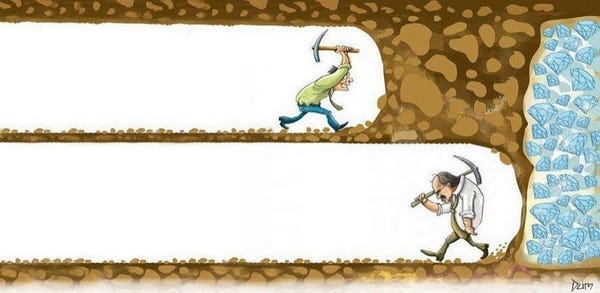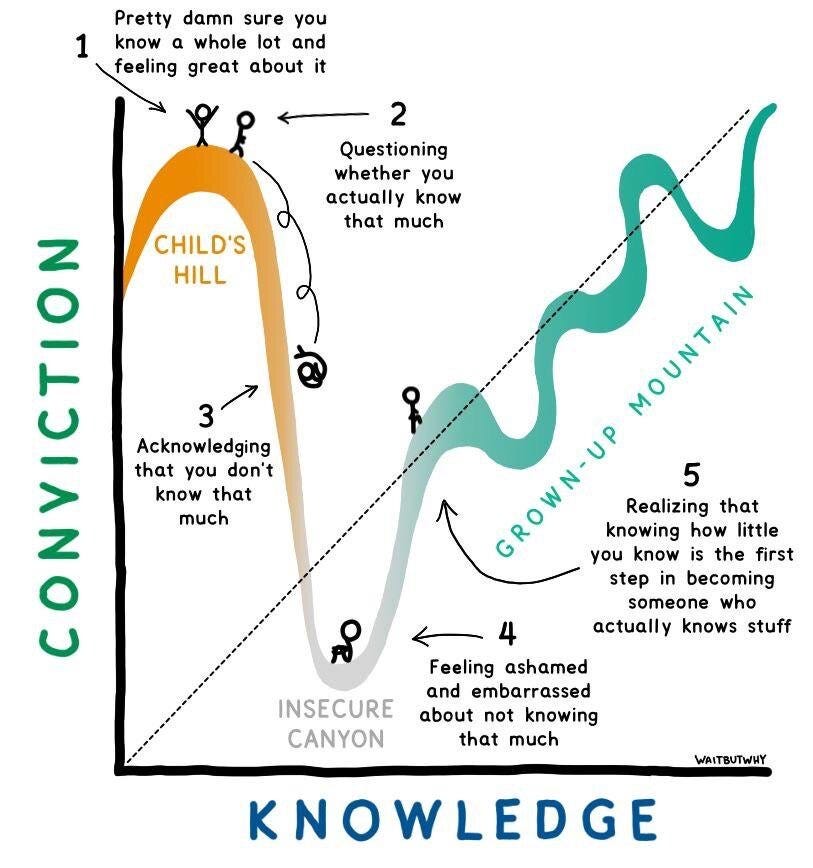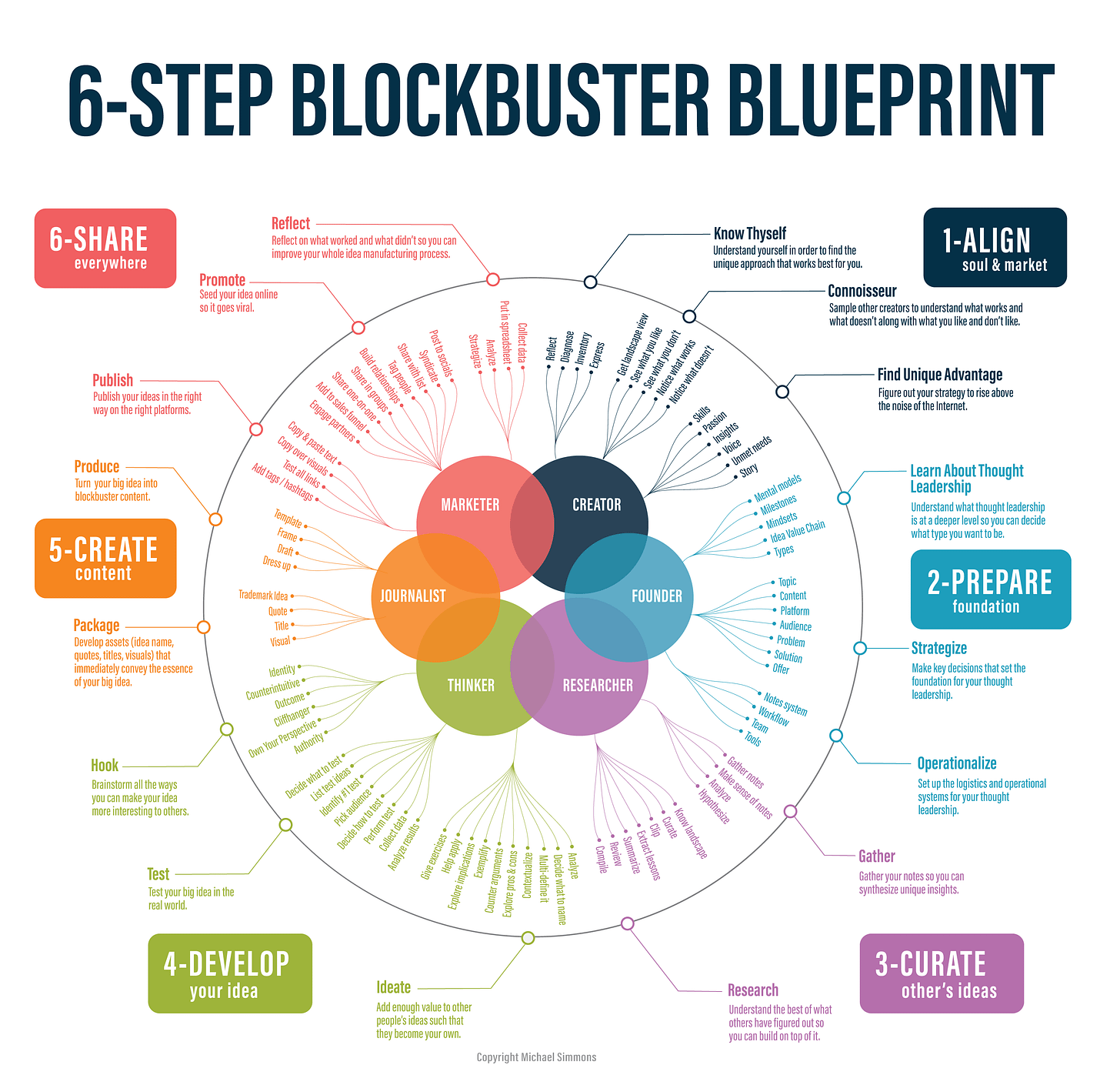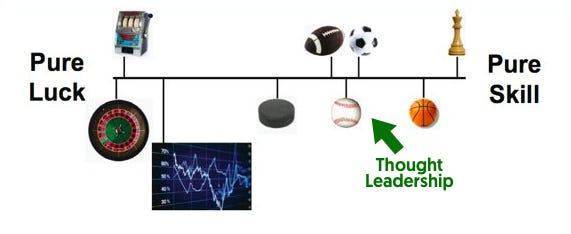Brutal Truth: It Takes Years To Become A $100k Thought Leader Working Part-Time (Unless You're Lucky)
Who This Post Is For
This post is for all of the people who are wondering what’s actually required to be a full-time thought leader earning $100,000+ a year while impacting thousands of people.
Why Realistic Financial Expectations Of The Thought Leadership Journey Matter
To be clear, for me, thought leadership is so much more than creating wealth. I was learning, journaling, and writing for years before I made any money because I love the craft. Even if I wasn’t paid at all today, I would still be a thought leader. This love of craft is what fueled me to work through the years when I wasn’t making any money.
At the same time, if we want to focus on thought leadership full-time, we need it to pay the bills, and we’d love for it to create wealth. For example…
If we’re losing money as a thought leader and have a limited runway, we need to know when we can expect the investment to pay off.
If we’re currently in a stable job, and we want to transition into thought leadership, we want to know when to make the transition and how to prepare for it.
If we’re going all in, we’d love to know that it has a realistic potential to create wealth for us into 6-figures and even 7-figures.
Bottom line: I focus on money in this post, because if you want to make a career as a thought leader, it’s critical to have realistic financial expectations so you can make the best decisions for you and your family.
Today’s Game Plan
Explore case studies of how long it took successful thought leaders to break out (Cal Newport, Ryan Holiday, Elizabeth Gilbert, James Clear, Ray Bradbury, Yuval Noah Harari, etc).
Learn the three biases and myths that cause us to under-estimate the difficulty of thought leadership in the short-term and over-estimate it in the long-term.
Learn the brutal truth and what it really takes financially to succeed as a thought leader (what I wish I had been told when I was younger).
Learn 3 actionable insights that are most likely to increase your likelihood and speed of success. (paid subscribers)
After Earning Millions, Being Coached By Individuals Who Have Earned Millions, And Helping Others Earn Millions As A Thought Leader, I Have Insight Into What It Really Takes
Over the years, I’ve experimented with many different ways of converting my knowledge into income and impact:
Book Publishing (2003). Self-published a book in college that sold 10,000 copies.
Speaking (2003-2013). Delivered 200+ keynote speeches and convened events with 1,000+ speeches, which earned millions of dollars.
Blogging (2003-2005). Started a blog after college with 250+ posts. It fizzled out.
Blockbuster Writing (2013-Present). Started writing for Forbes, Fortune, Inc., Entrepreneur, Harvard Business Review, World Economic Forum, and TIME. Then switched to writing on social media and my own platforms. The long-form writing has been read tens of millions of times.
Thought Leadership Agency (2015-2016). Helped successful entrepreneurs craft blockbuster content.
Courses & Coaching (2017-Now). Have facilitated several kinds of educational experiences at different price points ($1,000, $20/month, $10/month, $595, and $10,000), which have impacted thousands of people and earned millions of dollars.
Said differently, I’ve explored a lot of the paths to thought leadership monetization including courses, coaching, consulting, writing, speaking, and book publishing.
More so…
I have grown up with many peers who started from nothing and became successful in this field, which has helped me see different paths and timelines.
I have personally coached 100+ people one-on-one over a year and in some cases, years.
I have been mentored over the years by Eben Pagan, who has made hundreds of millions of dollars online.
This has given me a realistic and varied understanding of what’s hype and what’s not.
My personal mission is to help “professionalize” the field of thought leadership so it becomes a viable career path for tens of thousands of people. I’ve spoken to many people who have spent thousands (or even tens of thousands) of dollars on programs and not gotten results. As a result, many of them have given up or were on the cusp of giving up after losing hope that things would ever payoff. My experience is that this is the experience of MOST people who learn thought leadership, not just some. I want to change that.
On the other hand, many people who have spent years learning are closer to breaking out than they realize. As a result, they give up right before they breakthrough. I speak from personal experience on this one. I gave up on writing for 7 years before I tried it again and immediately broke through because I just used a better strategy. 7 years prior, I had been three feet from gold and didn’t realize it…
Bottom line: After all of my experiences in the world of thought leadership, I think it is one of the most rewarding, impactful, and financially lucrative careers for people who love learning and sharing what they learn with others. And, I think it’s a viable career path provided that people have realistic expectations, play the long game, and are deliberate about improvement.
Now, let’s get to the brutal truth…
It Takes Years For The Greats To Break Out
Over the years, I’ve collected the backstories of inspiring thought leaders. For example, Elizabeth Gilbert wrote for 10 years before she made enough money to become a full-time author…
Source: Acumen Academy
Ray Bradbury didn’t earn a $50,000 annual income (in today’s dollars) until he had been writing for 10 years…
Mr. Beast, the #1 creator in the world in terms of reach, spent 18 hours per day for 7 years focused on YouTube until he got enough traction to earn a livable wage.
And the list goes on…
I didn’t start having consistent blockbuster articles until I had self-published a book, written 250+ blog posts, and published 20+ long-form articles.
Cal Newport wrote 7 hours per week for 10 years until he had his big hit—Deep Work. The whole time Cal was either going to school or working a full-time job.
Ryan Holiday was a researcher for Robert Greene for years until he wrote his first book. Then, it was another three years until he had his big hit.
James Clear had several popular blogs for years before he wrote Atomic Habits, which has now sold 15M+ copies.
Yuval Noah Harari taught and iterated on his popular university class for years before he turned the content of his classes into his mega bestseller—Sapiens.
Ben Hardy journaled daily for five years before he had his first mega-viral article.
Jordan Peterson spent 30 years deliberately researching, teaching, and refining his communication abilities before he broke out at the age of 54.
Nassim Taleb started reading 40+ hours per week when he was 16 years old. He didn’t write his first book until he became a millionaire trader and Ph.D. in his late 30s.
Steven Pressfield, author of The War Of Art, has sold millions of books. What you may not know is that he didn't publish his first novel until he was 52 years old and had been writing for decades. He wrote for 17 years before he earned his first penny (a $3500 option on a screenplay that was never produced). He wrote for 27 years before he published his first novel (The Legend of Bagger Vance). During that time he worked 21 different jobs.
Mark Manson, author of The Subtle Art of Not Giving a F*ck, did not break out until he had been blogging for years and had written a book with mediocre sales.
These backstories all teach the same thing. Success takes a long time, but it is possible if we are deliberate over a long period of time.
This begs the question. If it takes years to be successful, why do so many people think it takes months…
3 Lies About What It Really Takes
Becoming a successful thought leader is way harder in the short-term than most beginners think.
This happens for three reasons…
Dunning-Kruger Effect: Beginners underestimate the difficulty of new skills and projects
Thought leadership hasn’t been “professionalized” yet and marketers create the narrative
Thought leaders who teach what they know suffer from the curse of knowledge at first
#1: Dunning-Kruger Effect: Beginners underestimate the difficulty of new skills and projects
Tim Urban perfectly illustrates what is known as the Dunning-Kruger Effect in the following illustration…
Beginners underestimate the difficulty of new skills and projects simply because they haven’t been close enough to see all the nuance. It’s sort of like eyesight. If you look at an apple from 20 inches away rather than 20 feet, you’re going to see way more detail.
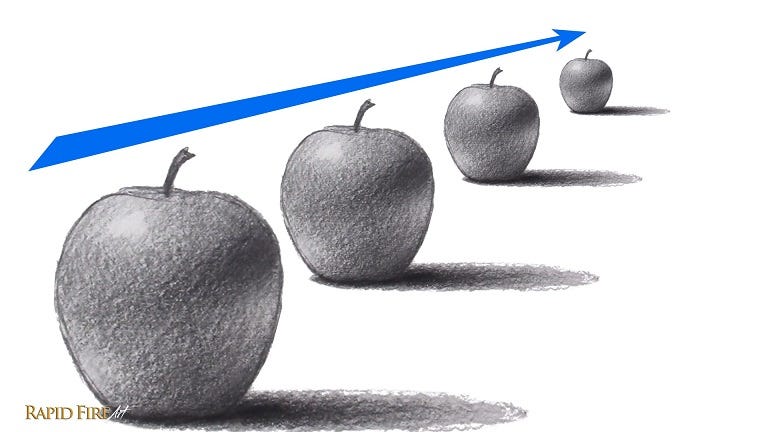
Similarly, when you see a skill from far away, you see fewer of the micro-skills required for mastery. For example, in the skill chart below, beginners can typically only see the top 6 steps and a little bit below that. Therefore, they think they just need to master a few things. However, expert thought leaders can see levels beyond this chart. They realize there are 100+ micro-skills and each of those skills need practice, feedback, emotional regulation, smart decisions, and the right mindsets to master.
#2: Thought leadership hasn’t been “professionalized” yet and marketers create the narrative
In many established professions, there are clear and realistic expectations concerning how long it takes to get a full-time position. For example, to become a surgeon in the US, we know that students need a whopping 10+ years of training.
Or to become competent enough as a programmer from scratch and land a high-paying job, it may take a year of full-time education to succeed.
With thought leadership, many people think they can succeed:
In months
Working part-time
While learning informally rather than deliberately
I think this misunderstanding happens for a few reasons beyond the Dunning-Kruger Effect…
Marketers have oversold how easy things are. Naturally, they have an incentive to make things look easier than they actually are so people sign up for their programs.
People think thought leadership is easy because publishing online is easy and they conflate publishing with thought leadership.
We see overnight success stories of people who got lucky quickly, and we think their rapid success is normal. Furthermore, it’s natural for any course creator to feature their top students rather than their average students.
I’m not sure what the exact reason is for the misunderstanding. But, what I know is that overnight success isn’t something that I’ve observed with any sort of regularity, and I’ve studied the careers of many, many successful creators. And even when beginners produce hit articles, they typically become one-hit wonders because they don’t have the skills to be able to capitalize on the success or repeat it.
#3: Thought leaders who teach what they know suffer from the curse of knowledge at first
When someone becomes an expert, they automate and layer new skills on top of each other. This automation helps the individual practice the skill faster and more easily without even thinking about it. For example, when it comes to typing and driving, you probably don’t even think about these anymore. You just do them.
On the other hand, when a skill becomes automated, we forget most of the details that would be necessary for us to teach others. Thus, we drastically underestimate what it takes students to succeed. This is known as the Curse of Knowledge.
For example, when I started Seminal, my year-long thought leadership program, I made it 8 weeks. I thought I would be able to teach everything I know and help people get mastery in just 60 hours or so. I was completely off.
Here’s another example. Think about when you first started learning to read (or when you saw a child learning to read).
The first phase was learning that these random shapes you were seeing were actually a new concept called letters…
As you developed a mastery of letters, you learned that they could be combined into a new concept called words and that these words could be accessed automatically…
Over time, you continued the layering process. You realized that words could form word groups, which could form clauses, which could form sentences, which could ultimately form stories.
And voila! You suddenly had a new magical ability: the ability to read. You no longer had to sound out each letter. Where there used to be randomness, you now saw order.
But now that you have this ability, it’s actually harder to teach a 2-year-old the nuances of what a shape is.
Now that we have a deeper understanding of the biases and myths that cause us to have unrealistic expectations, I’ll share my estimates of how long I think it takes people from different backgrounds to succeed on average…
But First, I Want To Offer A Caveat…
Everyone’s journey as a thought leader is different because everyone has a different starting line:
Existing body of knowledge
Existing thought leader skills
Existing mindsets
Different financial circumstances and needs
Unique goals, values, life experiences, and personality
Existing product-market fit
Furthermore, luck is a major factor. Some people may find success early because they hit on the right idea at the right time.
To put the role of luck in context, this is currently how I see thought leadership fitting in on the luck-skill continuum…
Now, back to the estimates…
My Estimates On How Long It Actually Takes To Succeed
First, I think that almost any competent professional can become a successful thought leader given enough time, learning, practice, and feedback.
Second, while luck is a major factor, skill and perseverance will virtually guarantee success. While huge hits contain a lot of luck, you’ll be able to create very successful articles on a regular basis without depending on luck.
Below are some guesses on how long it would take someone to earn $100,000/year spending 10 hours per week…
#1. Skilled Marketer/Entrepreneur With Existing Product—6 months
Existing assets: Proven product, proven funnel, deep understanding of the market
Existing skills: Copywriting, entrepreneurship
Rationale for estimate: Getting to the point where you have a basic product-market fit with a funnel can take years. The fact that you have this drastically decreases your time to financial success. Furthermore, copywriting as a skill is pretty rapidly transferrable to online writing whereas academic or ordinary professional writing takes longer.
#2. Expert (Researcher / Practitioner / Consultant / Coach)—3 years
Existing assets: Expertise in the topic
Existing skills: Research, knowledge-worker level of writing
Rationale: Creating content that rises above the noise of the internet and captures people’s attention consistently is already hard enough. But to then monetize that knowledge with a funnel and product, you’ll need copywriting and entrepreneurial skills, which also take years to learn. Furthermore, achieving product-market fit often takes many, many conversations with people in your target market to more deeply understand who they are, what problems they face, how they want to be communicated with, and what they want to buy. To become competent enough to earn a full-time income at all of these skills takes a long time.
#3. Early-Stage Professional With No Expertise—5+ years
Existing assets: Heart, desire, and time
Existing skills: Little professional experience
Rationale: Career beginners have a lot working against them because they have to start from scratch. On the other hand, what they lack in experience they can make up with earnestness.
While these numbers may be higher than most people think, the good news is that it’s roughly equivalent to learning any other advanced skill. Furthermore, if you go through the process, the odds of being able to earn a full-time income are high.
These numbers aren’t set in stone though, and they only represent averages. You can accelerate your journey in a few ways…


